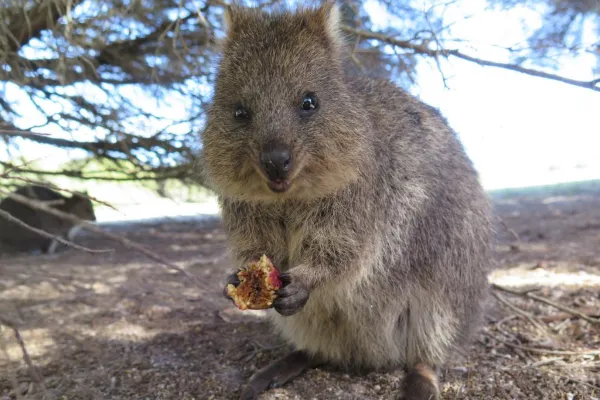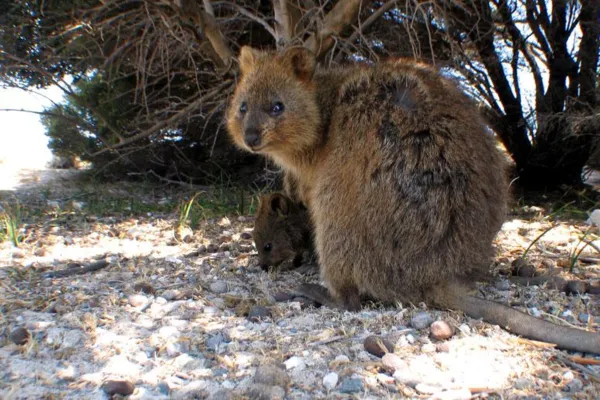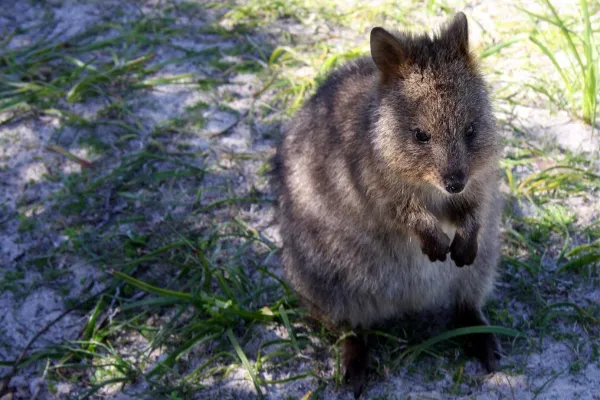Have you ever seen this adorable little creature with a constant smile on its face? The quokka (Setonix brachyurus) has gained worldwide fame since 2013 as the “happiest animal in the world.” With its charming grin and friendly personality, it has become a viral sensation on social media. Many travelers visiting Australia—the only country where it naturally lives—hope to spot one in the wild and take a selfie with this marsupial.

In this article, we’ll explore everything you need to know about the quokka, including its habitat, lifespan, appearance, personality, and the threats it faces today.
Quokkas are native to Western Australia, found mainly on Rottnest Island and Bald Island. The name “Rottnest” comes directly from the quokka: in the late 1600s, Dutch explorer William Dampier saw these animals and mistook them for giant rats. He called the island Rattennest (“rat’s nest”), which later evolved into “Rottnest.”
Today, Rottnest Island has become a popular tourist destination, attracting thousands of visitors eager to meet the “world’s happiest animal.”
In the wild, quokkas typically live for about 10 years. They are mostly nocturnal herbivores, although they may also be somewhat active during the day. Quokkas obtain most of their water from the leaves they eat and can survive for long periods without drinking or eating.
Quokkas are marsupials, meaning females carry and nurse their young in a pouch, much like kangaroos. Newborn joeys stay in the pouch for up to six months, feeding on milk before becoming independent.
Size: 40–90 cm long (similar to a domestic cat)
Weight: 2.5–5 kg
Appearance: Stocky body covered in brown fur, long and powerful hind legs, and a relatively hairless tail.
Special traits: A thick, bushy tail with lighter brown rings that helps with balance, climbing, and keeping warm during cold nights.
Their strong legs allow them to move with quick, agile hops, and their round faces with chubby cheeks give them a cute, fox-like appearance.

Quokkas are docile, curious, and non-aggressive. They often approach humans without fear, making them one of the most approachable wild animals in Australia. Their playful and friendly personality makes them seem even more endearing.
What truly makes them famous is their smiling expression. Their narrow snouts and rounded cheeks naturally give the impression of a cheerful grin, which has captured hearts worldwide. This is why, since 2013, the quokka has been celebrated as “the happiest animal in the world.”
Countless photos and videos show quokkas interacting comfortably with people, reinforcing their reputation as friendly and photogenic animals.
Despite their fame, quokkas are not entirely safe. According to the IUCN Red List of Threatened Species, the quokka is currently classified as Vulnerable, with its population in decline.
Tourism Pressure – Tourists often feed them unsuitable foods, disrupting their diet and leading to malnutrition.
Illegal Capture and Trade – Some are taken from the wild and sold illegally as exotic pets or to private zoos.
Accidents and Human Interaction – Being fearless around people makes them vulnerable to accidents, including road fatalities.
Habitat Loss – Expansion of human activities reduces their natural habitat.
In Australia, strict laws now protect quokkas. Touching, feeding, or capturing them is prohibited, with fines ranging from 300 to 2,000 AUD. The only exception is when rescuing an injured or endangered animal, in which case authorities must be notified immediately.

The quokka’s cheerful smile has made it a global icon of happiness, but behind its fame lies a vulnerable species that urgently needs protection.
If you ever visit Australia and encounter a quokka:
Do not feed them human food.
Do not touch or pick them up.
Take photos from a respectful distance.
This way, we can ensure that quokkas continue to thrive in their natural habitats and bring joy to future generations.
animal tags: quokka
We created this article in conjunction with AI technology, then made sure it was fact-checked and edited by a Animals Top editor.